10 Super-Safe Dividend Stocks to Buy Now
Want to have your cake and eat it, too? Here are 10 safe dividend stocks that have a strong history of boosting cash payouts to shareholders.


Profit and prosper with the best of Kiplinger's advice on investing, taxes, retirement, personal finance and much more. Delivered daily. Enter your email in the box and click Sign Me Up.
You are now subscribed
Your newsletter sign-up was successful
Want to add more newsletters?

Delivered daily
Kiplinger Today
Profit and prosper with the best of Kiplinger's advice on investing, taxes, retirement, personal finance and much more delivered daily. Smart money moves start here.

Sent five days a week
Kiplinger A Step Ahead
Get practical help to make better financial decisions in your everyday life, from spending to savings on top deals.

Delivered daily
Kiplinger Closing Bell
Get today's biggest financial and investing headlines delivered to your inbox every day the U.S. stock market is open.

Sent twice a week
Kiplinger Adviser Intel
Financial pros across the country share best practices and fresh tactics to preserve and grow your wealth.

Delivered weekly
Kiplinger Tax Tips
Trim your federal and state tax bills with practical tax-planning and tax-cutting strategies.

Sent twice a week
Kiplinger Retirement Tips
Your twice-a-week guide to planning and enjoying a financially secure and richly rewarding retirement

Sent bimonthly.
Kiplinger Adviser Angle
Insights for advisers, wealth managers and other financial professionals.

Sent twice a week
Kiplinger Investing Weekly
Your twice-a-week roundup of promising stocks, funds, companies and industries you should consider, ones you should avoid, and why.

Sent weekly for six weeks
Kiplinger Invest for Retirement
Your step-by-step six-part series on how to invest for retirement, from devising a successful strategy to exactly which investments to choose.
Safe dividend stocks are like the equity investment world's version of having your cake and eating it, too: Not only do investors get a nice dividend payout every quarter, but they also participate in the stock's gains. If the stock price slides, the dividend is there to cushion the blow.
But how, exactly, does one determine whether a dividend is truly safe?
One place we like to look on occasion is the DIVCON system from investment firm Reality Shares, which analyzes stocks that pay a dividend among the largest U.S. companies. These are not your conventional choices; they weren't picked just for their dividend yield. Rather, these are the safest dividend stocks, rated highest for both potential future cash payouts and share price increases.
DIVCON (which stands for "dividend condition") uses seven factors to assess a company's dividend health: dividend growth forecast, levered free cash flow, earnings growth, five-year dividend history, buybacks, financial strength and the dividend health score given by a third party.
Companies are then given a DIVCON Score between 1 and 100, then assigned a DIVCON Rating between 1 (highest probability of a dividend cut) and 5 (highest probability of a dividend increase). The implication? Firms with high scores are likely safe dividend stocks.
Why this matters: Companies with the highest dividend growth rates have outperformed the S&P 500 Index since 2000, whether in boom times (the 2009-2020 bull market, for example) or bust (think the 2007-2008 financial crisis), according to Reality Shares.
That brings us to the safest dividend stocks to buy, as rated by DIVCON. Every stock on this list earns the highest DIVCON rating of 5. We've further culled the list down to 10 stocks that offer a total dividend and buyback yield of at least 2%, and price-to-earnings (P/E) ratios in the trailing 12 months that are below or on par with the broader market. (On April 28, S&P 500's P/E was 43, and its dividend yield stood at 1.4%.)
Data is as of April 28.

Quest Diagnostics
- Market value: $17.2 billion
- DIVCON score: 55.5
- 5-year average total yield (dividend and buybacks): 4.7%
- Price-to-earnings ratio – trailing 12 months (TTM): 10.0
The pandemic has been good to both the top- and bottom-line for Quest Diagnostics (DGX, $131.68). As the largest independent diagnostic testing provider globally, Quest reported stellar first-quarter results due to COVID-19 testing demand. Revenue rose by 49% from a year ago, operating profit climbed 277% and adjusted earnings per share jumped 300%.
The second quarter looks to be robust as well, according to Morningstar analyst Debbie Wang. While the pandemic boost will eventually fade, Quest remains in good market position due to its size and cost advantage that lets the company "benefit from several secular trends," Wang says.
These include proliferation of diagnostic tests and greater clinical reliance on personalized therapies. Also, lower reimbursement rates will make hospital labs and independents outsource more work to the largest, lowest-cost firms such as Quest, she adds.
Quest and LabCorp (LH) are the two heavyweights among independent diagnostic testing providers. With their vast national networks, the two have erected "barriers to entry and generated substantial cost advantages" over regional and hospital labs, Wang says. For example, hospital lab tests typically cost triple on average than the same test at Quest. Most recently, Quest also began managing hospital labs or acting as a consultant for them.
Moreover, insurers and other payers usually would rather negotiate with a national testing lab like Quest instead of dealing separately with many smaller, regional labs, the analyst says.
Quest's focus on "esoteric" tests will pay off with drug and biotech companies aiming to provide personalized and targeted therapies. "This bodes well for Quest," Wang notes.
Meanwhile, DIVCON notes that Quest has 265% of the free cash flow it needs to cover the payout, signaling high dividend safety. The system also rates DGX among the market's safest dividend stocks based on strong earnings growth and a high Altman-Z score of 6.4. Altman Z uses five factors to measure a company’s credit strength, and any score above 3 indicates a low likelihood of bankruptcy.
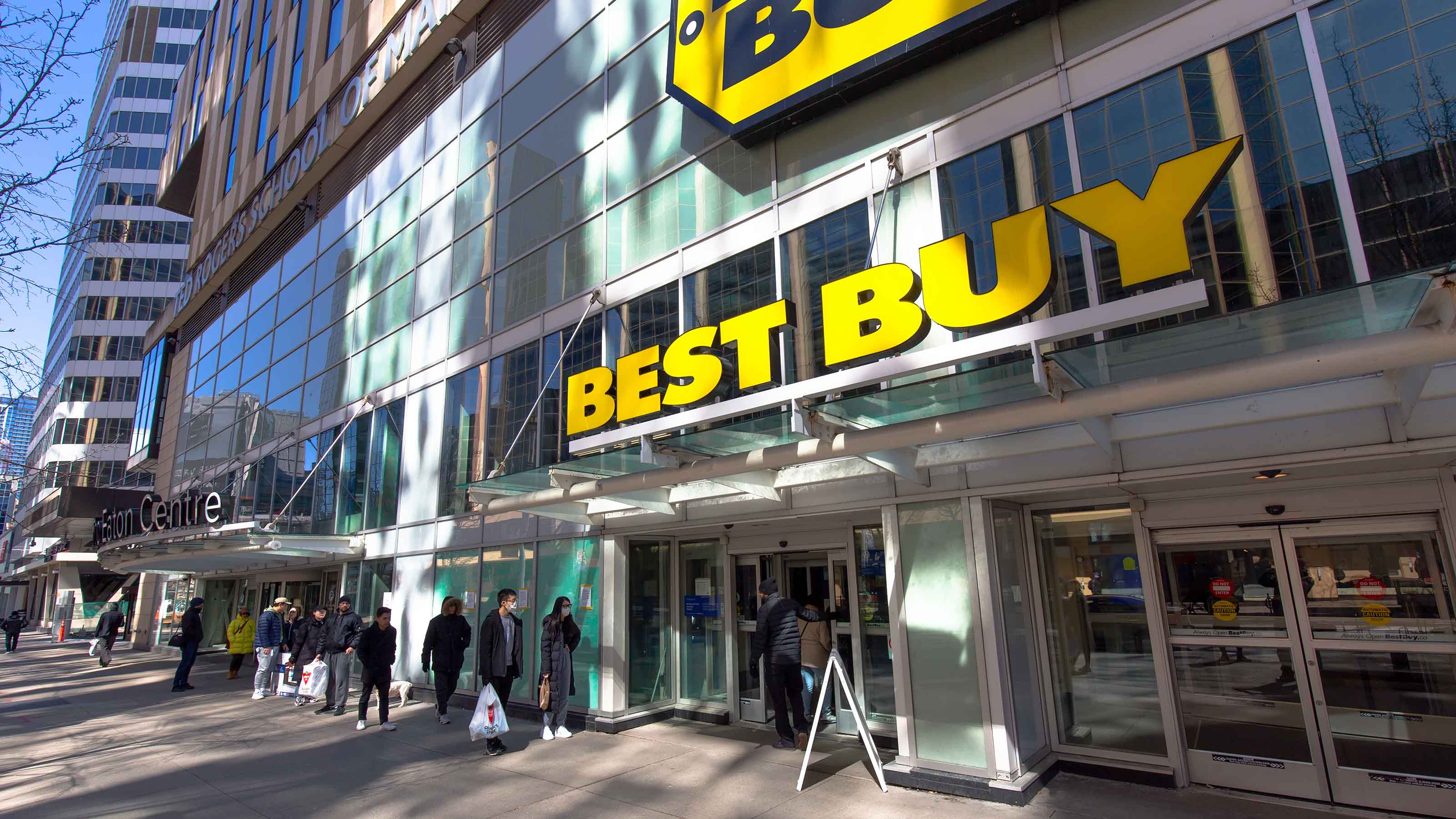
Best Buy
- Market value: $29.3 billion
- DIVCON score: 62.2
- 5-year average total yield (dividend and buybacks): 8.8%
- P/E (TTM): 17.1
Best Buy (BBY, $117.19) is the only pure-play, nationwide consumer electronics retailer left in the U.S. The company has survived online and big box competition over the years by reducing costs, divesting unproductive businesses, matching Amazon.com's (AMZN) prices, setting up store-within-a-store areas for Apple and other key vendors and adopting more effective marketing and operating practices, say analysts at Argus Research.
It is also good to shareholders: In its latest fiscal quarter, Best Buy raised its quarterly dividend by 27%. Over the last five years, it has raised its dividend at a compound annual growth rate (CAGR) of 19%, says Argus. And as of Jan. 30, it had about $5.5 billion in cash.
"Best Buy has done an excellent job bolstering its finances both before and during the pandemic," says Argus Research analyst Chris Graja.
Certainly, the work-from-home trend has raised demand for electronic products and services. Best Buy's investments in e-commerce infrastructure and management's ability to adapt has helped it weather the pandemic, adds Graja.
Best Buy also is moving into the "Smart Home" space, offering monitoring systems for seniors (GreatCall) and babies, fitness equipment connectivity and more.
Best Buy's "best-in-class fulfillment capabilities, high mix of essential items, and well positioned peer services/Great Call initiatives should propel it to gain further market share over both the near-term and long-term," says Raymond James analyst Bobby Griffin.
And DIVCON rates Best Buy among the Street's safest dividend stocks thanks to free cash flow that's more than 700% of what's necessary to keep its payout bankrolled, as well as a solid Bloomberg Dividend Health reading of 31.3. (Bloomberg uses a -100 to 100 scale in which a positive reading signals potential for dividend growth.)
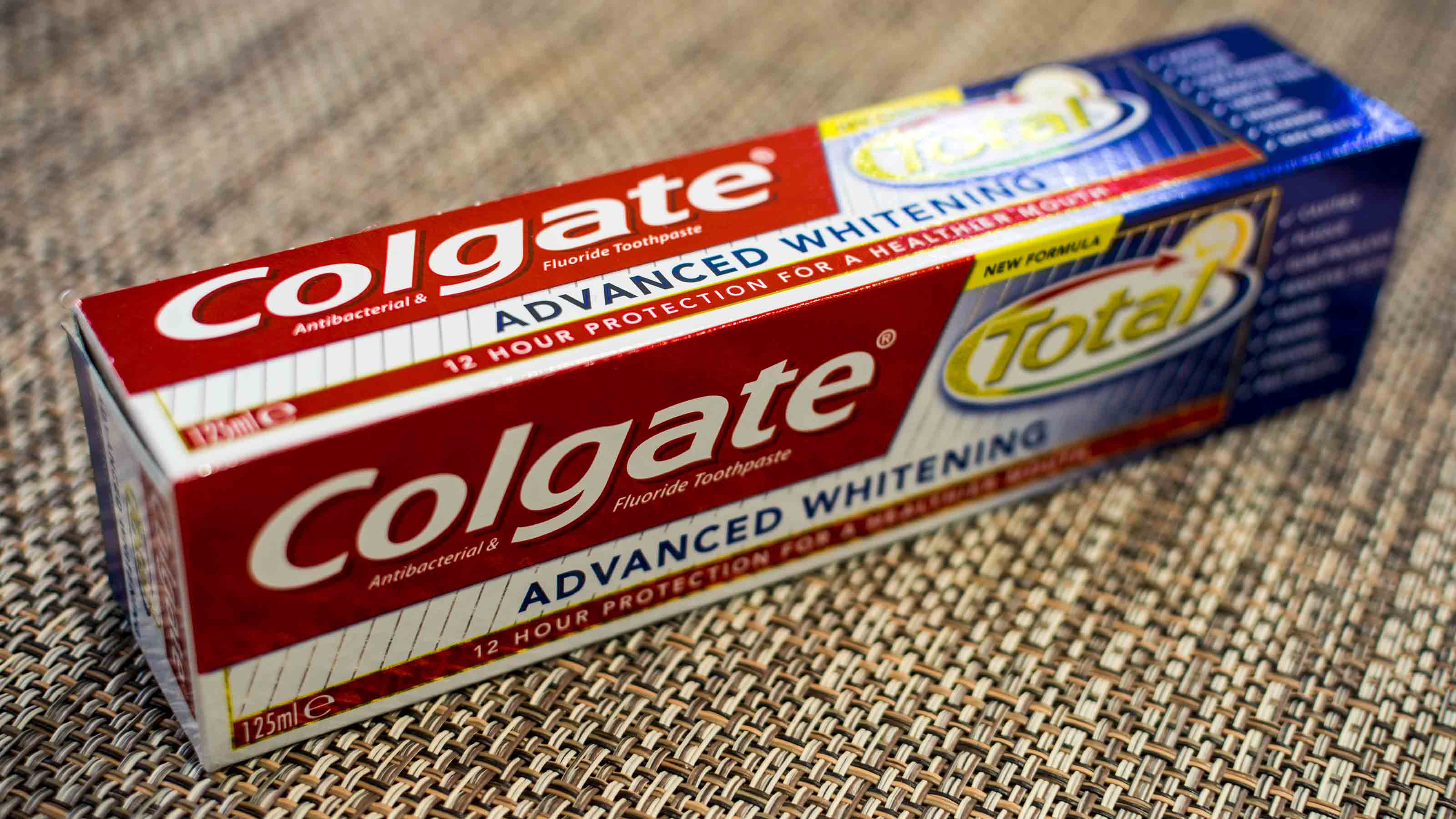
Colgate-Palmolive
- Market value: $68.8 billion
- DIVCON score: 64.0
- 5-year average total yield (dividend and buybacks): 4.4%
- P/E (TTM): 25.1
For fans of the safest dividend stocks, Colgate-Palmolive (CL, $78.77) is a good choice because of its consistency: It has paid a dividend every year since 1895 and has raised it for 59 years straight, says Argus Research analyst Chris Graja. Its latest dividend increase came on March 11, when it raised the quarterly cash payout by 2.3% to 45 cents per share. The dividend yield for Colgate is 2.3%.
Colgate has been a storied name in oral care for decades and continues to dominate the industry; holding a 40% global market share in toothpaste, for example. But the consumer products giant isn't sitting on its laurels. To continue to drive sales, the company launched one of its biggest initiatives in 20 years with improvements to the Colgate Total brand and increases to its ad spending, says Graja.
Colgate is also expanding its product lines to include more items with natural ingredients and promoting new pet foods for younger animals, or special foods for senior pets with kidney problems, Graja adds.
Some innovations that have been well-received include its Optic White "pen" used to whiten teeth overnight, and Co. by Colgate, a line of premium oral care products that look more like a designer label than a supermarket shelf staple.
This year, Graja believes Colgate will be focusing on premium products, online sales, analytics and productivity improvements. He has a Buy rating on the safe dividend stock. Colgate's many brands include Colgate, Palmolive, Irish Spring, Softsoap, Ajax, Fab, Protex and Hill's Science Diet.

Aflac
- Market value: $36.8 billion
- DIVCON score: 65.2
- 5-year average total yield (dividend and buybacks): 6.6%
- P/E (TTM): 8.0
Aflac (AFL, $53.37), which provides supplemental health and life insurance in the U.S. and Japan, is a "rare discount find" in this overvalued market, says Triton Trade, which owns the safe dividend stock. AFL is in a good position "due to its large market share, healthy balance sheet, strong brand recognition and cash on hand." Aflac is the top provider of supplemental insurance in the workplace and insures 25% of Japanese households.
Aflac has paid dividends since at least 1992, with the quarterly payment rising from a penny to 33 cents per share over that time. This year, Raymond James analyst C. Gregory Peters says he expects Aflac to pay out $1.3 billion in dividends and up to another $1.9 billion in share repurchases in 2021.
Peters raised his price target on Aflac to $60 in February, a 12.4% premium to the safe dividend stock's current price. Like other insurance stocks, he says, Aflac has outperformed vis-à-vis the S&P 500 Index due to a more positive outlook for the industry and inexpensive valuations. He also likes Aflac due to its higher return on equity compared to the peer group average.
Zacks Equity Research recently upgraded the stock to Buy due to an upward trend in earnings estimates that signal "an improvement in the company's underlying business." Changes in earnings potential and near-term stock price movements are "strongly correlated," Zacks says. "Investors' appreciation of this improving business trend should push the stock higher."
DIVCON also likes "the duck," rating it among Wall Street's safest dividend stocks thanks to a 900%-plus FCF-to-dividend ratio, among other attractive dividend-safety traits.

Texas Instruments
- Market value: $167.9 billion
- DIVCON score: 65.2
- 5-year average total yield (dividend and buybacks): 5.2%
- P/E: 27.6
Texas Instruments (TXN, $181.82) is the world's largest manufacturer of analog chips, which are used to convert audio, video and other real-world signals into digital forms, and back again. These chips are the bridge between the analog and digital world. For example, analog chips can convert speech into digital data to be stored on CDs, and they can also revert digital audio into waveforms to be heard.
The company also is a key supplier of embedded chips such as microcontrollers, or MCUs. MCUs are chips found in many products (outside of computers), including mobile phones, refrigerators, microwave ovens, cars and airplanes. These chips enable the operations of these products and equipment.
Morningstar analyst Brian Colello gave Texas Instruments a "wide economic moat" rating due to its proprietary chip designs and manufacturing expertise, as well as for having product stickiness because it's difficult to switch to a competitor once the chip is designed into an electronic device.
The company also has a buffer against being disrupted. Analog engineering talent is hard to come by, and it takes years to train engineers in the intricacies of chip designs. "It is extremely difficult for startups to replicate the many years of analog expertise held by incumbents," Colello says.
Raymond James analyst Chris Caso has another reason to like the safe dividend stock: Amid today's widespread chip shortages, it's in a good spot having built its inventory during last year's economic downturn. "That puts Texas Instruments in an advantageous position to supply customers amid widespread industry shortages," Caso says.
He upgraded the safe dividend stock to Outperform in February.
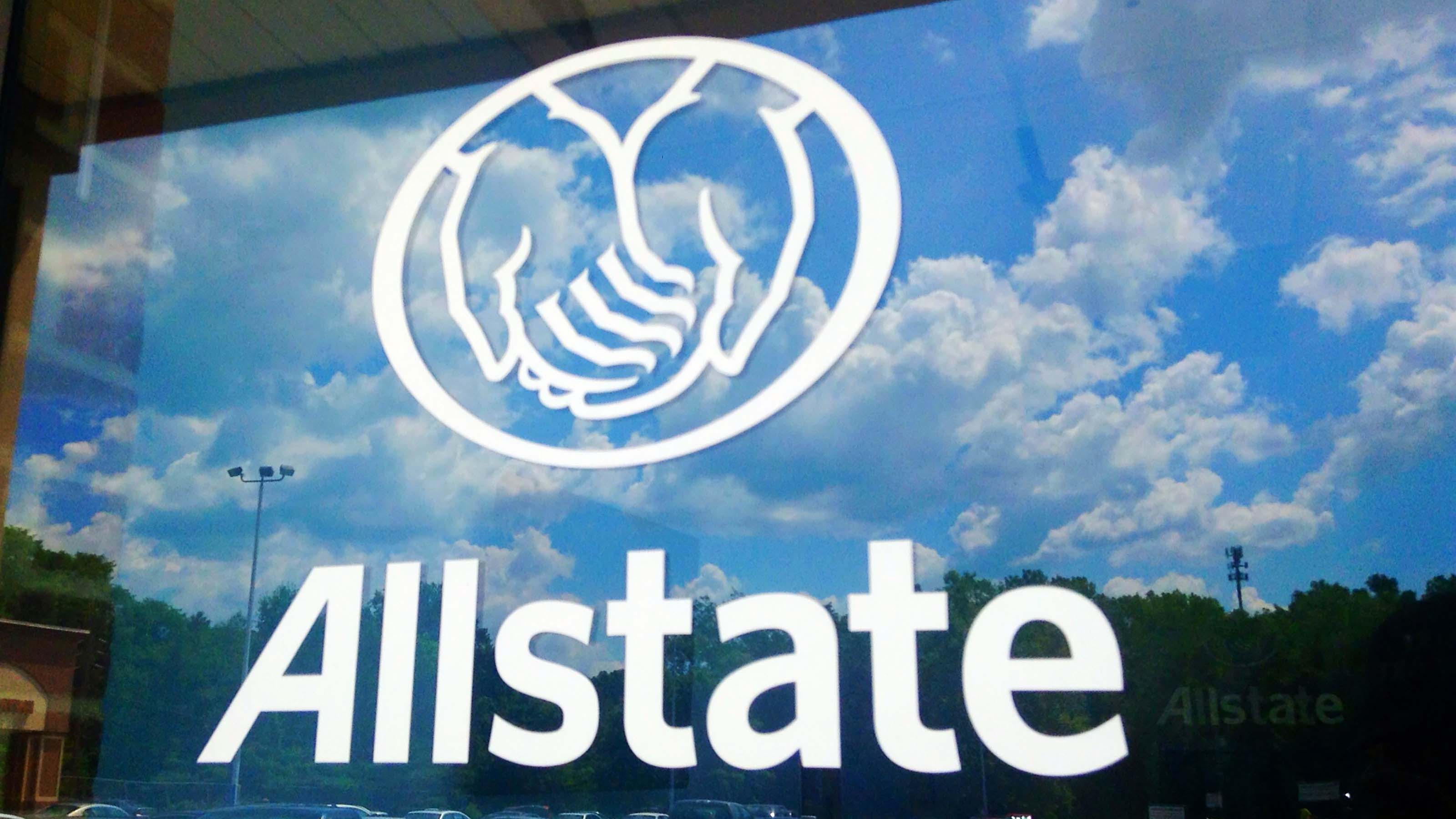
Allstate
- Market value: $37.6 billion
- DIVCON score: 65.3
- 5-year average total yield (dividend and buybacks): 7.8%
- P/E: 7.2
Property-casualty insurance giant Allstate (ALL, $125.35) is sharpening its business focus. In January, the company announced it was selling its underperforming life and annuity unit to Blackstone (BX) for $2.8 billion. Two months later, Allstate completed its exit from these lines of business by agreeing to sell its New York operations separately to Wilton Re for $220 million.
"We think shedding these capital intensive, non-core assets will free up nearly $2 billion of deployable capital Allstate can use for its core property-casualty business (and related select acquisitions) as it builds out its property-casualty focused model," says research firm CFRA.
In January, Allstate closed a deal that would do just that – its $4 billion acquisition of National General. Allstate has been trying to diversify outside the captive agent network, which is a mature distribution channel. The National General deal is "likely to fortify Allstate as one of the top five personal line carriers in the independent agent distribution channel," says Zacks Equity Research.
Allstate also plans to expand its protection services business, which keeps safe consumers' identities and devices.
"All these initiatives have been driving the company's prospects, boosting customer base and re-establishing trust on the Allstate brand," Zacks analysts say. The firm added that Allstate has been shifting capital to higher growth areas and returning value to shareholders through buybacks and quarterly cash payout increases – making it one of the safest dividend stocks to have on your radar.
Meanwhile, strong earnings growth and high FCF compared to its dividend put Allstate among Wall Street's safest dividend stocks, according to DIVCON.
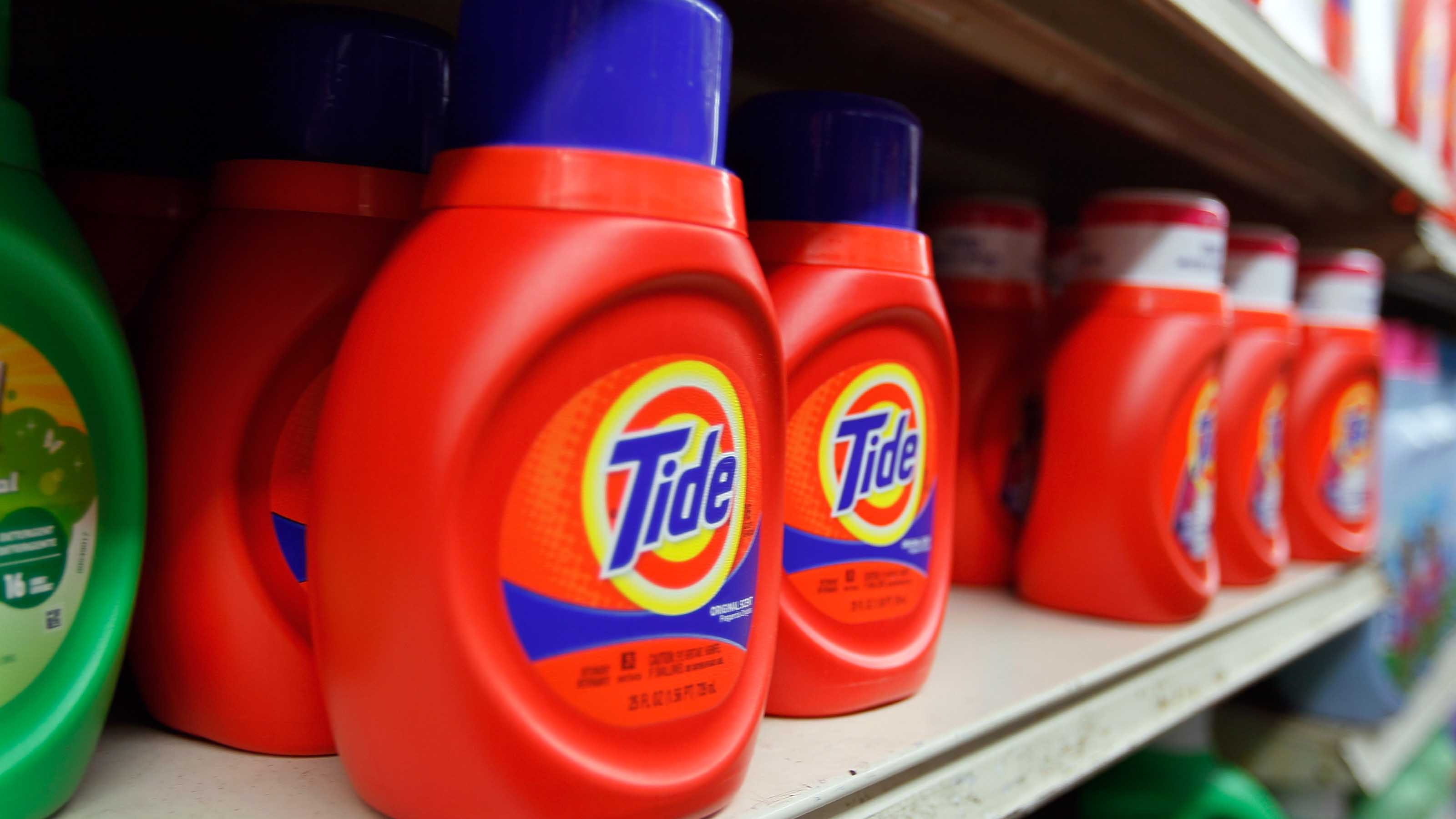
Procter & Gamble
- Market value: $321.7 billion
- DIVCON score: 65.7
- 5-year average total yield (dividend and buybacks): 5.4%
- P/E: 24.2
Consumer products giant Procter & Gamble (PG, $131.40) increased its dividend for the 64th straight year in 2020; it is also the 130th consecutive year it has paid a dividend.
Procter & Gamble is one of an elite group of companies that paid dividends for more than 120 years straight. And according to P&G Chief Financial Officer Jon Moeller, only three other U.S. companies have increased dividends for more consecutive years than the Cincinnati-based firm. From fiscal 2010 to 2020, it has raised its dividend from $1.80 to $3.03 per share. This year, the company expects to pay out $8 billion in dividends.
P&G also plans to buy back $7 billion to $9 billion of shares, and potentially up to $10 billion. Dividends and repurchases combined should return $18 billion in cash to shareholders this fiscal year, Moeller says, which comprises more than 125% of all-in earnings.
Through COVID, P&G said it has seen products in family, fabric and home care increase, but other categories such as shaving and deodorants did not fare as well due to work-from-home practices. Going forward, he sees a potentially "lasting" shift to e-commerce, lower-cost ways of working with fewer resources and new digital tools brought forward to drive productivity.
P&G is embracing lean innovation, reinventing brand building, advancing supply chain network capabilities using machine learning to better understand consumption patterns and raw material availability and using data analytics to make sure products are in the right stores and shelves.
Morningstar rates the safe dividend stock as a wide-moat company with "healthy" revenue growth.
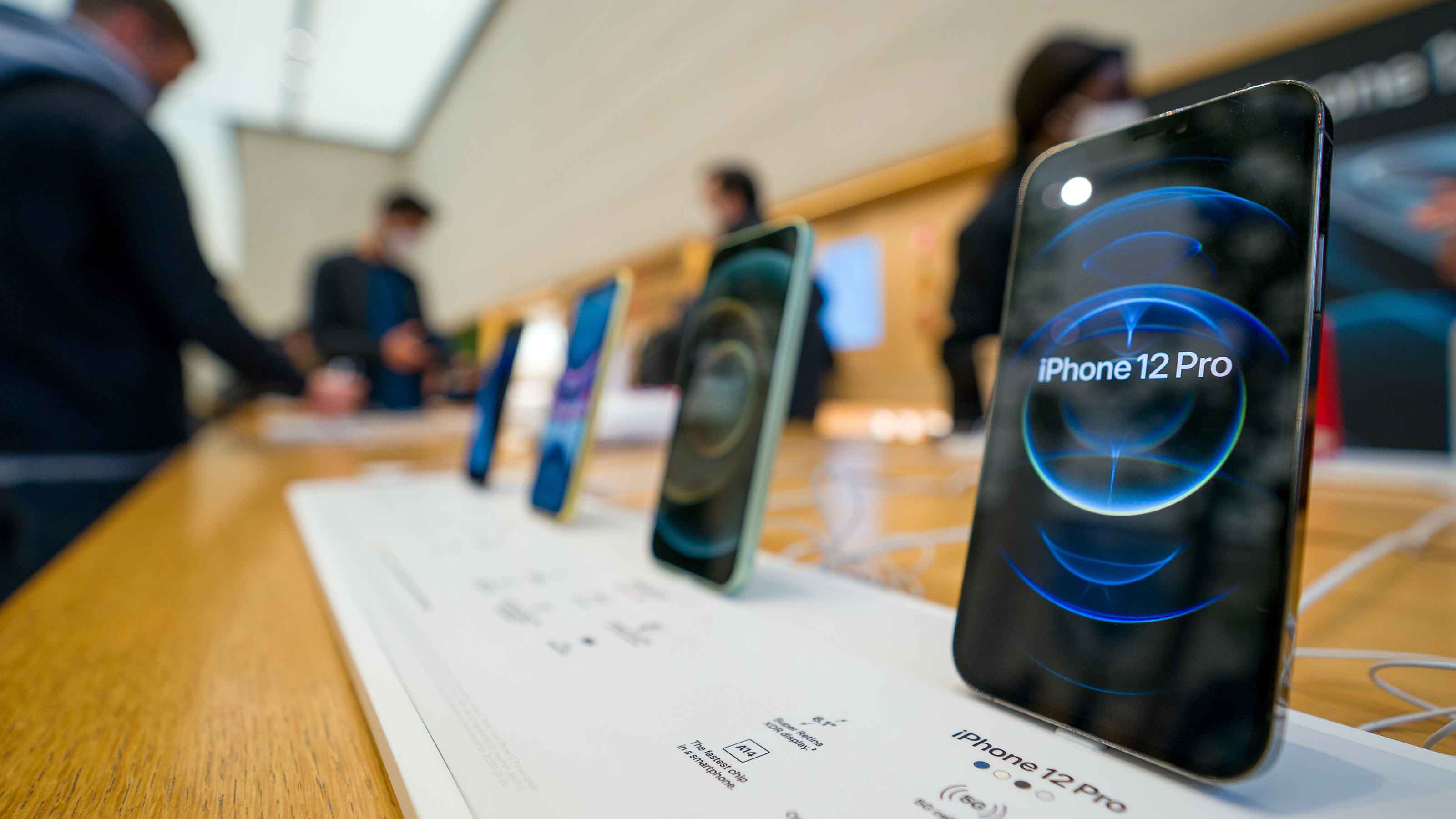
Apple
- Market value: $2.2 trillion
- DIVCON score: 67.0
- 5-year average total yield (dividend and buybacks): 6.8%
- P/E: 29.9
Apple (AAPL, $133.58) shares have seen a modest gain of 0.7% year-to-date even as the broader market continues to hit record highs. Still, the stock is up about 85% in the last 12 months, and has more than doubled from its pandemic lows.
This FAANG stock also enjoys an average Buy rating among the 29 analysts tracked by Yahoo Finance that follow the company. Morgan Stanley recently maintained its Overweight recommendation on the safe dividend stock, while UBS updated Apple to Buy from Neutral. Evercore and Wedbush have AAPL at Outperform.
Few companies can boast the financial health of this tech giant. In its fiscal second-quarter earnings report released April 28, Apple revealed it has nearly $121.5 billion in cash, cash equivalents and marketable securities (easily convertible to cash) as of the end of March. Meanwhile, revenue hit $89.6 billion in the first three months of 2021, up 54% from a year ago. Earnings per share spiked 119%.
What's more, the iPhone maker authorized $90 billion in stock buybacks and a 7% quarterly dividend hike – both of which will benefit shareholders. Given an already-high 641% FCF-to-dividend ratio, Apple has room for plenty more dividend growth down the road, leading DIVCON to rank it among the safest dividend stocks you can buy.
Still, Apple has to prove its innovation engine will keep roaring. On April 20, the company unveiled a slew of new updates at its first product launch event for 2021: updated and colorful iMacs, new iPad Pros, a new Apple TV 4K, AirTags, and new colors for the iPhone 12. Investors were not impressed; the stock was down as much as 2.2% before ending the session down more than 1%.
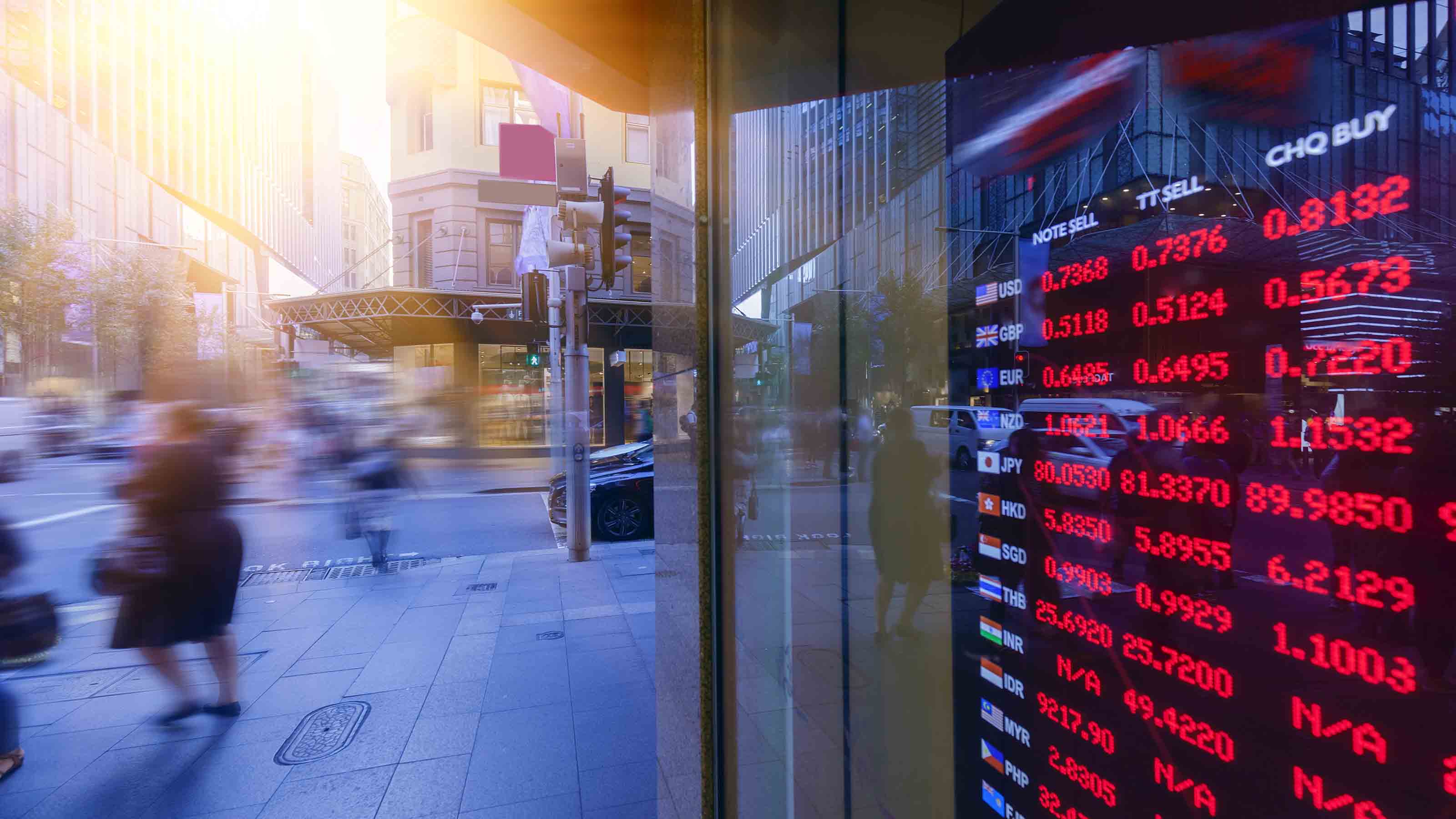
Cboe Global Markets
- Market value: $11.0 billion
- DIVCON score: 67.5
- 5-year average total yield (dividend and buybacks): 2.7%
- P/E: 24.0
Cboe Global Markets (CBOE, $102.71), which operates the Chicago Board Options Exchange, is the largest U.S. options exchange by trading volume.
It has a history of introducing innovative financial products and services, from being the first U.S. exchange to trade listed options and creating options contracts based on broad stock indices, to inventing the widely adopted Cboe Volatility Index (VIX) and becoming the first incumbent exchange to offer bitcoin futures (discontinued after two years but exploring a re-launch).
With its acquisition of Bats Global Markets in 2017, Cboe became one of the largest exchange holding companies in the world, broadening its business into U.S. and European stocks, exchange-traded funds and foreign-exchange products.
This year, it further expanded overseas by acquiring Chi-X Asia Pacific Holdings, an operator of equity trading venues in Australia and Japan.
According to Zacks, Cboe has been seeing "solid" earnings revision activity over the past month, "suggesting analysts are becoming a bit more bullish on the firm's prospects in both the short and long term."
Moreover, Cboe is in an industry that is gaining traction: securities and exchanges. "This is important because, oftentimes, a rising tide will lift all boats in an industry," Zacks says. "This is arguably taking place in the securities and exchanges space."
But Raymond James and UBS remain on the sidelines on Cboe. UBS is concerned about lower trading volume trends following the release of Cboe's March metrics. Raymond James cited a strong industry-wide backdrop for U.S. equities and options trading, but remains unconvinced and gave the safe dividend stock a Market Perform rating.
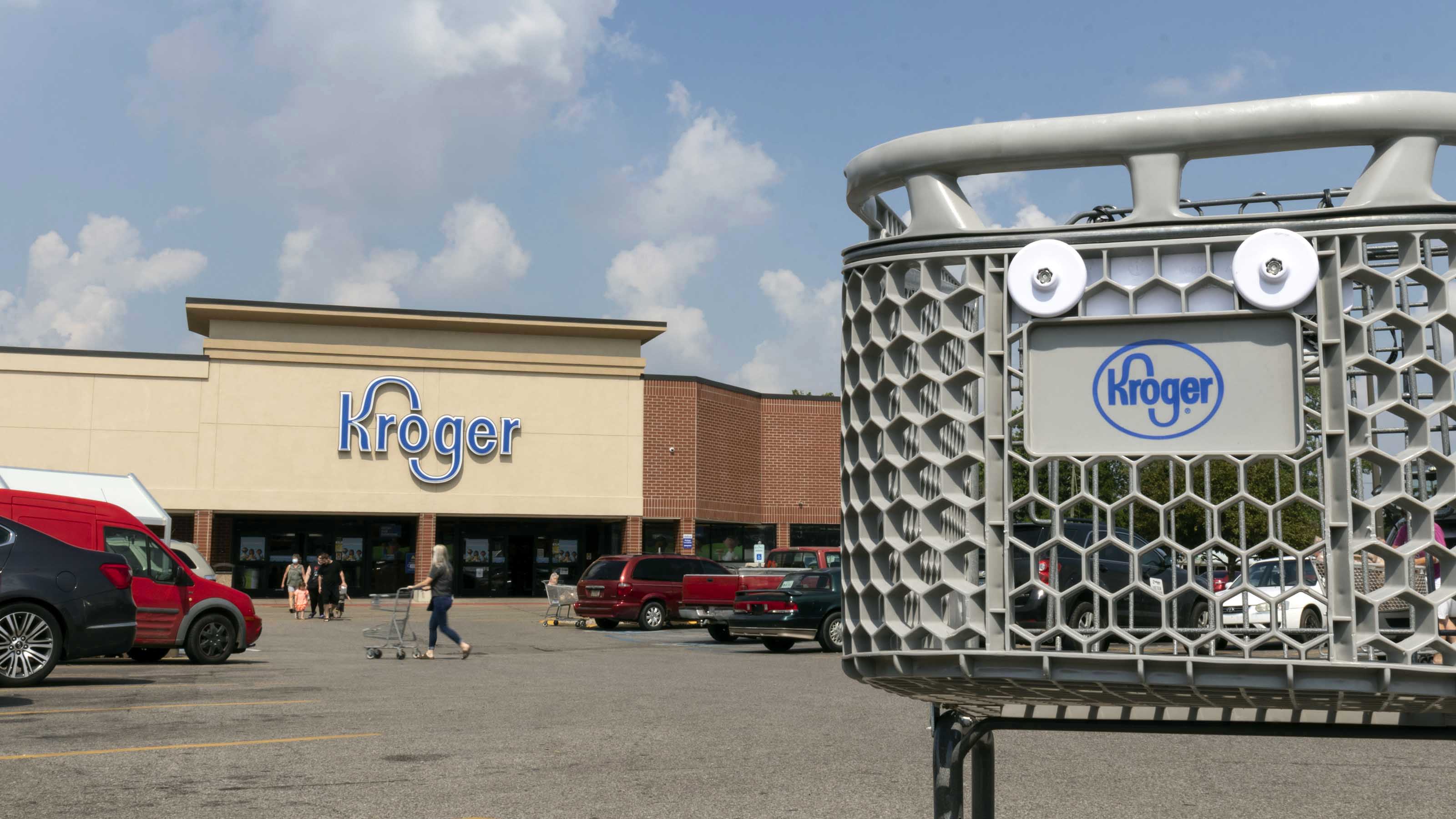
Kroger
- Market value: $27.6 billion
- DIVCON score: 68.2
- 5-year average total yield (dividend and buybacks): 7.2%
- P/E: 11.2
While Amazon.com is the retail heavyweight its competitors fear, when it comes to fresh food, other grocers arguably do a better job.
One in particular is Kroger (KR, $36.65), the largest pure-play grocery chain in the country with 2,800 stores in 35 states that operate under the names Kroger, Ralphs, Fred Meyer, Food 4 Less, King Soopers, Smith's Food and Drug, Fry's Food and Drug, Dillons, City Market and Harris Teeter. Its grocery sales are second only to Walmart (WMT), according to Morningstar.
Kroger customers rank its fresh foods departments higher than those of all large national retailers, says Argus Research analyst Chris Graja. This is important because 70% of customers choose grocers based on the quality of their fresh foods, he adds. Graja has a Buy rating on the safe dividend stock.
The grocery chain is also aggressively innovating. Kroger recently piloted its "Hometown Pickup" concept, which are additional locations it set up apart from its supermarkets. Customers order online and choose which Hometown Pickup location to get their groceries. This initiative expands Kroger's reach, and business should grow over time since it can serve several customers with one trip, says UBS analyst Michael Lasser.
Another innovation is a partnership with Ocado to handle its fulfillment centers for online orders. One Ocado "shed" can handle sales equivalent to 20 stores but needs only 60% of capital and 60% of the labor, Graja says. Kroger also is investing in meal kits such as Home Chef, which could become its next "billion-dollar brand," Lasser says.
And Kroger's dividend is unimpeachable. KR generates more than 600% of what it needs to keep the dividend checks in the mail, putting the grocer among Wall Street's safest dividend stocks.
Profit and prosper with the best of Kiplinger's advice on investing, taxes, retirement, personal finance and much more. Delivered daily. Enter your email in the box and click Sign Me Up.

Deborah Yao is an award-winning journalist, editor, and personal finance columnist who has held editorial roles at Kiplinger, The Wharton School, Amazon, The Associated Press, S&P Global (SNL Kagan) and MarketWatch. She specializes in writing and editing articles on finance and technology, with particular expertise in the areas of stock analysis, monetary policy, fintech, blockchain, macroeconomics, financial planning, taxes, among others. She has been published in The New York Times, USA Today, CBS News, ABC News, Wharton Magazine, and many other news outlets.
-
 The Cost of Leaving Your Money in a Low-Rate Account
The Cost of Leaving Your Money in a Low-Rate AccountWhy parking your cash in low-yield accounts could be costing you, and smarter alternatives that preserve liquidity while boosting returns.
-
 I want to sell our beach house to retire now, but my wife wants to keep it.
I want to sell our beach house to retire now, but my wife wants to keep it.I want to sell the $610K vacation home and retire now, but my wife envisions a beach retirement in 8 years. We asked financial advisers to weigh in.
-
 How to Add a Pet Trust to Your Estate Plan
How to Add a Pet Trust to Your Estate PlanAdding a pet trust to your estate plan can ensure your pets are properly looked after when you're no longer able to care for them. This is how to go about it.
-
 Nasdaq Slides 1.4% on Big Tech Questions: Stock Market Today
Nasdaq Slides 1.4% on Big Tech Questions: Stock Market TodayPalantir Technologies proves at least one publicly traded company can spend a lot of money on AI and make a lot of money on AI.
-
 Fed Vibes Lift Stocks, Dow Up 515 Points: Stock Market Today
Fed Vibes Lift Stocks, Dow Up 515 Points: Stock Market TodayIncoming economic data, including the January jobs report, has been delayed again by another federal government shutdown.
-
 Stocks Close Down as Gold, Silver Spiral: Stock Market Today
Stocks Close Down as Gold, Silver Spiral: Stock Market TodayA "long-overdue correction" temporarily halted a massive rally in gold and silver, while the Dow took a hit from negative reactions to blue-chip earnings.
-
 Nasdaq Drops 172 Points on MSFT AI Spend: Stock Market Today
Nasdaq Drops 172 Points on MSFT AI Spend: Stock Market TodayMicrosoft, Meta Platforms and a mid-cap energy stock have a lot to say about the state of the AI revolution today.
-
 S&P 500 Tops 7,000, Fed Pauses Rate Cuts: Stock Market Today
S&P 500 Tops 7,000, Fed Pauses Rate Cuts: Stock Market TodayInvestors, traders and speculators will probably have to wait until after Jerome Powell steps down for the next Fed rate cut.
-
 S&P 500 Hits New High Before Big Tech Earnings, Fed: Stock Market Today
S&P 500 Hits New High Before Big Tech Earnings, Fed: Stock Market TodayThe tech-heavy Nasdaq also shone in Tuesday's session, while UnitedHealth dragged on the blue-chip Dow Jones Industrial Average.
-
 Dow Rises 313 Points to Begin a Big Week: Stock Market Today
Dow Rises 313 Points to Begin a Big Week: Stock Market TodayThe S&P 500 is within 50 points of crossing 7,000 for the first time, and Papa Dow is lurking just below its own new all-time high.
-
 Nasdaq Leads Ahead of Big Tech Earnings: Stock Market Today
Nasdaq Leads Ahead of Big Tech Earnings: Stock Market TodayPresident Donald Trump is making markets move based on personal and political as well as financial and economic priorities.
